Für statistische Zwecke und um bestmögliche Funktionalität zu bieten, speichert diese Website Cookies auf Ihrem Gerät. Das Speichern von Cookies kann in den Browser-Einstellungen deaktiviert werden. Wenn Sie die Website weiter nutzen, stimmen Sie der Verwendung von Cookies zu.
Cookie akzeptieren
Brooke Speer Orr
The ¿People¿s Joan of Arc¿
- Peter Lang
- 2014
- Gebunden
- 322 Seiten
- ISBN 9781433102578
The 'People's Joan of Arc': Mary Elizabeth Lease, Gendered Politics and Populist Party Politics in Gilded-Age America is the first comprehensive biography tracing the captivating life of renowned activist Mary Elizabeth Lease. While Lease is most remembered in American history textbooks as the radical leader of the Populist Party who directed desperate farmers «to raise less corn and more hell», her influence and involvement in the late- nineteenth-century women's suffrage movement and early-twentieth-century feminist movement place her on par with luminaries such as Susan B. Anthony. Lease's story stretches from the American Civil War to the Great Depression and particularly illustrates how gender conventions and the related complexities of class and ethnic identity have historically shaped American politics. The diverse suits Lease wore, including housewife, teacher, lawyer, women's rights activist, temperance advocate, Populist Party orator, Knights of Labor activist, Irish Nationalist, Socialist, Progressive reformer, Republican Party supporter, and «Bull Moose» campaign worker, reflect and highlight the factors fueling America's reform impulse in the decades framing the turn of the twentieth century and likewise make her a fascinating historical character. Lease's political opponents accused her of raising too much «hell», while her supporters praised her for translating their sense of societal and economic disempowerment into concrete, proactive political actions. Mary Elizabeth Lease was a heroine to her supporters and a dangerous, unfeminine demagogue to her opponents. Either way, she was unquestionably one of
Mehr
Weniger
zzgl. Versand
in Kürze